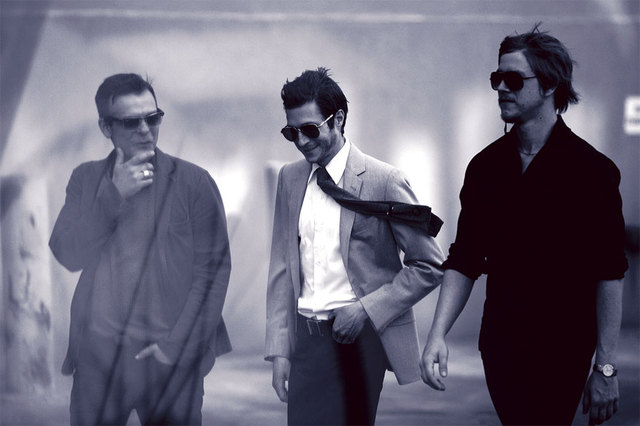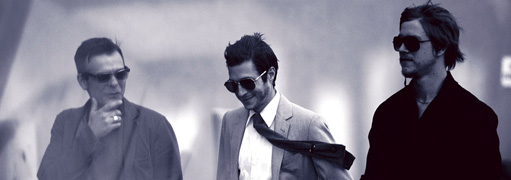In the universe of popular music, relatively few bands are able to achieve critical and commercial success and do it with sophistication. But Interpol has been merging all three for nearly a decade. Dark intellectualism is a hallmark of the band, which was at first characterized as part of early aughts’ post-punk revival movement. These days, Interpol seems more like an island. After returning to Matador Records for a self-titled fourth album, the band’s music still involves the same atmospheric and introspective qualities it always has, but the operation feels more refined and distinctive. Though bassist and founding member Carlos Dengler left the group before Interpol was released in the fall (followed by the departure of his touring replacement, David Pajo, this year), the men of Interpol might be happier than they’ve ever been. That’s according to drummer Sam Fogarino, who says he wants to dispel any notions that the band is having a trying time. “It’s business as usual—everything is fine,” he says from London over a crackling phone line. What about the band’s playing and songwriting has gone through the most metamorphosis since the first full-length album in 2002? I think it’s the execution in which the ideas can be realized. I think it’s gaining the power to not rely on a happy accident, you know, and being really deliberate. I think that’s been the biggest gain out of being together for so long. Really being able to say “I want to do X,” and it happens and it sounds good and it’s right. That’s very rewarding. I think it’s the biggest leap—at this point in time we can do whatever we want, and it would be honest. What’s been challenging about all the bass-player turnover? Actually we’ve been really lucky. As a drummer, I’ve been super fortunate to where there hasn’t been the negative challenge … . There hasn’t been a nightmare yet in terms of post-Carlos bass players. Interpol is based in New York City, but you call Athens, Ga., home—how does the long-distance relationship work? When I first bought a house down there, we were still touring for Our Love to Admire. We wrapped up the tour, and I just went down there and kind of disconnected from the world for quite a few months. I rented an apartment to go write this new record and did a lot of traveling back and fourth—a little bit stressful, but it kind of gave me the best of both worlds. It was pretty fun actually, to have this duality in my life at that point in time. So how do you deal with spending months on the road? No matter what, there’s always an initial burst of excitement because we all really do love playing music together in front of people who like hearing it—that can never get old. But it does have its arch, you know, and you’ve kind of got to glide down the decline, because you really want to get into your own bed and have just a little bit of normalcy in one spot. We have a decent way of laying out the tour so there’s always a couple of weeks off between the legs. But it’s part of the game. And you’re in another band with Adam Franklin from Swervedriver. What’s it like collaborating with him? I was a big Swervedriver fan in the early ’90s and really didn’t stop listening to Swervedriver throughout that whole decade into the early 2000s. I was really bizarre one day to get a message from him through a friend. I believe he wanted me to join a solo project of his, but I was too steeped in the writing of Our Love to Admire . But we became friends and started hanging out a lot in Manhattan, and then I just approached him with this material—all of these kind of half-written songs that I had banged out over the course of maybe 10 years. Much to my surprise and sheer fucking excitement, he liked them, and we turned them into Magnetic Morning songs and ended up doing an EP and a full-length together. It was dreamy. … We’ll see what happens in the future. We’re both very busy with not a lot of downtime in between what we do for a living. Outside of the music itself, Interpol’s developed a reputation for sharp fashion. Do you have any comment on how you’ve cultivated your style? You know, it’s kind of funny. It’s a weird line to tread. It was never a plan for Interpol to look so sharp. It truly was something we each brought into the fold. We look, merely, like ourselves. I think that’s kind of a testament to why things work out so well, because not only did we jell musically, but the whole package kind of just worked out with no real conceptualizing. No one sat down when I joined the band and told me what to wear. I just showed up as myself. How do you expect that not to have happened? People will talk about that. But clothes and rock music have been synonymous for decades. It only becomes troublesome when people don’t look past what we’re wearing, and they perceive it to be a concept. Sometimes you really don’t want to get stuck talking about clothing when you fear that your music, the most important thing, is going to get overlooked. It used to be, for me, a very cautious line to tread, but now I don’t care. I like clothes! A lot of men and women love clothes, and they like looking a certain way—it’s just honest to me. Wearing what I wear in the band, it’s like skin. I don’t question it, and that’s pretty much that. So who makes your favorite hat? There’s a cool little T-shirt/skater company, actually, called Brixton out of San Diego. While I was in Germany one year I took notice of what they call a German Alpine Corps hat. So it’s like this branch in the military that kind of hung out in the mountains—mountain rangers or whatever. But their hats were fucking so cool. Lo and behold, Brixton did a version of this hat, and I picked one up, and I’ve never had so many compliments on a hat before. I think I would die without it. It kind of took me out of my fedora phase. Has Interpol been contacted by Interpol, the international police organization? Supposedly Paul [Banks, guitarist and lead singer], on our first European tour, met a real Interpol agent. I don’t know how it was certain that this guy was really an agent, but Paul was convinced. Even more interesting than that is back in the day, a lot of emails that should have gone to the proper Interpol came to us. And they were pretty frightening, with like, “My brother has been missing for two weeks, can you help me?” And it was like, Oh my god, you’re contacting a rock band in New York. Do you ever have the urge to fight crime? You know, it’s kind of funny, yeah. Yeah. It’s all fantastical. It would never really happen, but yeah. In that kind of Marvel comic book way—you really wouldn’t know that I truly am a real Interpol agent. That would be kind of funny, but I imagine real-life crime fighting—that’s stressful shit, man. [ Laughs. ] I’ll just stick with drums. Do you guys have any tricks up your sleeves in the live show on this tour? Um, here and there perhaps, but I wouldn’t be able to say, because that would be giving the tricks away.











